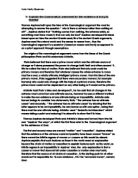In Genesis 1 the order of creation is: light, land, vegetation, day and night, creatures of the sea, birds, livestock, wild animals and finally humans. Although humans were made in God’s image they are the final addition to God’s world. The phrasing of this produces confusion for God say’s, “in our image”, this suggests that there is a group of Gods rather than one ruling over all. This is often seen as God’s recognition of human presence becoming inevitable, so when he says, “our” he refers to him/herself and humanity. In chapter 2 of Genesis the order of creation is much different. Rather than humans creation being the cherry on the top they are the very first creation from which all else is based. Also the verse says the “Lord God made the earth” which suggests creation ex nihilo rather than order from chaos. Equally different from the first chapter, God only creates man originally and women come much later. These contradictions are often the basis of many of the criticisms levelled at Genesis.
The difference between God the creator and God the builder is very important and is the basis of all Christian belief. Although there is confusion within the text it is interpreted as being a theory of creatio ex nihilo, separating God from all else in existence.
God’s omniscience, omnipresence and omnipotence are central to his superiority over humans. Yet if God is truly omniscient then why did he plant the tree of knowledge in the Garden of Eden from which Eve was tempted to eat the forbidden fruit. If God is omniscient he would have known Eve would eat the fruit and therefore deliberately tempted her, if this is correct then it brings in the morality of God. If God knew all this then he deliberately caused Eve pain which would be an evil act, and thus God is not pure goodness, but flawed like the human race. Secondly if God is omnipresence how can he take a physical presence and walk through the Garden of Eden and have a face to face conversation with Adam. As soon as God takes a physical form like when he breathes into Adam’s nostrils in chapter 2 he is less divine and less unique. God is worshipped because he isn’t human, because he is separate and omnipotent, a force that is beyond human understanding. If he isn’t omniscient or omnipresent does this make him less divine?
Differences within the genesis story raise these questions and are the basis of doubt for many non believers.
“The creative God of the Bible is similar to Aristotle’s Prime mover” Discuss.
(10 marks)
A creative God and Aristotle’s Prime mover are similar in a variety of ways. Both are separate and more powerful than anything of worldly origins. They are both eternal and thus timeless. The very basic idea of a “higher power” is followed in both these examples. Yet there are huge differences between the two theories. The creative God of Judeo Christian beliefs is very much an active participant of the world, he can talk to the people and act upon the requests of humanity. He has the ability to participate in life and have a direct effect on life.
This is very different to the Prime mover idea; Aristotle believed that there is a higher being that is in its entirety passive to life. The prime mover is the original efficient cause that began all the activity within the universe but from that action, has taken no further action. Aristotle believed that in order for his prime mover idea to work, the higher force must be infallible in all ways. He must have no potential for potential involves change which the PM can never do. The only effect that the PM has on the world is to attract the people of it, to him. They are attracted to his perfection, he takes no action, never intervenes and has no plan for it, and this is why he is perfect. He has no flaws because on a very basic level he never makes a decision that can be “wrong”. Morally he also is passive and so therefore can never be evil. Many argue that this inability or refusal to act make the PM an imperfect idea, for he is not perfect but truly neutral.
Within the Judeo Christian religions the problem of Evil and suffering is often a reason not to believe or question the beliefs of others. This isn’t an issue within the PM theory for, the PM never intervenes and therefore all evil is human made, yet equally so is all goodness within the world. Within the Judeo Christian religions it is equally the ability of God to do good that attracts people to believe as it is the recognition that evil and suffering is a part of life. God has an active role to play within humanities existence whereas the PM is simply an unmoved ideal that all people are attracted to.







